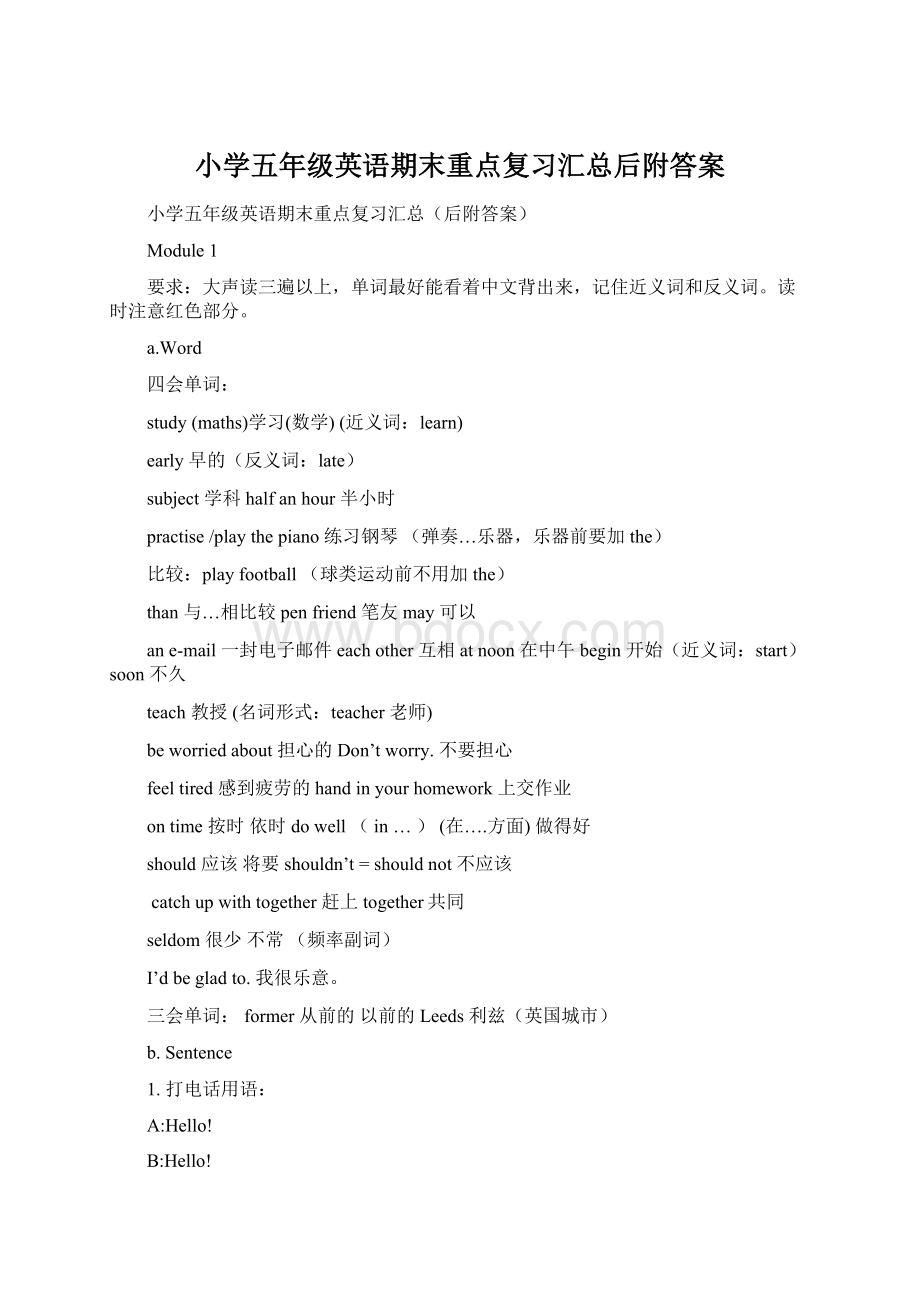 小学五年级英语期末重点复习汇总后附答案.docx
小学五年级英语期末重点复习汇总后附答案.docx
- 文档编号:4617223
- 上传时间:2022-12-07
- 格式:DOCX
- 页数:14
- 大小:29.46KB
小学五年级英语期末重点复习汇总后附答案.docx
《小学五年级英语期末重点复习汇总后附答案.docx》由会员分享,可在线阅读,更多相关《小学五年级英语期末重点复习汇总后附答案.docx(14页珍藏版)》请在冰豆网上搜索。

小学五年级英语期末重点复习汇总后附答案
小学五年级英语期末重点复习汇总(后附答案)
Module1
要求:
大声读三遍以上,单词最好能看着中文背出来,记住近义词和反义词。
读时注意红色部分。
a.Word
四会单词:
study(maths)学习(数学)(近义词:
learn)
early早的(反义词:
late)
subject学科halfanhour半小时
practise/playthepiano练习钢琴(弹奏…乐器,乐器前要加the)
比较:
playfootball(球类运动前不用加the)
than与…相比较penfriend笔友may可以
ane-mail一封电子邮件eachother互相atnoon在中午begin开始(近义词:
start)soon不久
teach教授(名词形式:
teacher老师)
beworriedabout担心的Don’tworry.不要担心
feeltired感到疲劳的handinyourhomework上交作业
ontime按时依时dowell(in…)(在….方面)做得好
should应该将要shouldn’t=shouldnot不应该
catchupwithtogether赶上together共同
seldom很少不常(频率副词)
I’dbegladto.我很乐意。
三会单词:
former从前的以前的Leeds利兹(英国城市)
b.Sentence
1.打电话用语:
A:
Hello!
B:
Hello!
A:
MayIspeaktoMary?
B:
Thisis(It’s)Maryspeaking.Who’sthat,please?
A:
It’sXiaolinghere.
B:
Hello,howareyou?
A:
I’mfine,thankyou.Andyou?
B:
I’mfine,too.Thanks.
2.介词的搭配
Onweekdaysshealwaysdoesherhomeworkafterdinner.
Attheweekendshepractisesthepianoforhalfanhourlikeyou.
3.
Iwanttobeherpenfriend.我想成为她的笔友。
WhatshouldIdo?
我应该怎么做?
Ishould…
Let’shelphimtogether.让我们一起帮助她。
Heplayscomputergamestoomuch.他玩太多的电脑游戏。
Hecan’tdowellinclass.他在课堂上表现不好。
Heislateforwork/school.他上班/上学迟到。
Couldyouhelpme?
I’dbegladto./Yes,ofcourse./Sure./Yes,please./OfcourseIcan.
c.语法
(一)一般现在时:
特征词:
与every连用的时间;不变的事实;频率副词(always-usually-often-sometime-seldom-never)等(详见前面一般现在时的笔记)
1.主语为非三单时,动词用原形。
肯定句:
Igetupearlyonweekdays.
否定句:
Idon’tgetupearlyonweekdays.
一般疑问句:
Doyougetuponweekdays?
Yes,Ido./No,Idon’t.
特殊疑问句:
Whatdoyoudoonweekdays?
Igetupearly.
2.主语为三单,动词要变化。
肯定句:
Healwaysworksinhisbedroomafterdinner.
否定句:
Hedoesn’talwaysworkinhisbedroomafterdinner.
一般疑问句:
Doeshealwaysworkinhisbedroomafterdinner?
Yes,hedoes.No,hedoesn’t.
特殊疑问句:
Whatdoeshedoinhisbedroomafterdinner?
Healwaysworksinhisbedroomafterdinner.
(在否定句和问句中,助动词do变为does,动词就不变化。
)
(二)情态动词
内容:
can,could,must,will,would,may,should
用法:
后面跟动词原形。
例句:
Wemustn’tpicktheflowers.
Youmaye-maileachother.
WewillgotothezoothisSunday.
Ishouldtakearest.
Module2
A.Words
四会单词:
feelill感觉有病lookpale看起来脸上苍白
What’sthematter?
有什么问题吗?
wakeup醒来
getdressedquickly快点穿衣服
bad坏的(反义词:
good)first首先
haveacold感冒haveaheadache头痛
haveatoothache牙痛haveapain疼痛
haveafever发热;发烧haveabath洗澡
takemedicinethreetimes服药三次sweet糖果
you’dbetter=youhadbetter你最好…
三会单词:
plentyof许多(单数形式:
plenty)
giveyouacheckup给你做个身体检查
haveastomachache胃痛;肚子痛
B.症状名词
(I)haveacold(.)(我)感冒(了。
)
(Ihavea)headache(.)(我)头痛(。
)
(Ihavea)toothache(.)(我)牙痛(。
)
(Ihavea)fever(.)(我)发热;发烧(了。
)
(Ihavea)stomachache(.)(我)胃痛;肚子痛(。
)
(Ihavea)pain(here.)(我这里)痛苦;疼;痛(。
)
B.Sentence
1.看医生用语:
Doctor:
What’sthematter?
Patient:
Idon’tfeelgood/well.
Doctor:
Youlooktiredandpale.
Patient:
IthinkI’mill.
Patient:
SometimesIfeelhotandsometimesIfeelcold.
Doctor:
Openyourmouthandsay“Ah”.Youhaveafever.
Doctor:
Youshoulddrinkplentyofwater.
Doctor:
Takethemedicinethreetimesaday.
Doctor:
You’dbetterstayinbed.
2.重点句型:
Idon’twanttobelateforschool.我不想上学迟到。
Janetdoesn’tfeelgoodthismorning.Janet今天早上感觉不好。
(今天早上应翻译成thismorning)
Letmegiveyouacheckupfirst.让我先给你做个检查。
(固定搭配)
Doyouwalkaloteveryday?
你每天都走路吗?
(alot=verymuchdrinkalot,thanksalot)
Ireadforalongtimeeverynight.我每个晚上都阅读很长时间。
(for后一般跟较长的一段时间)
Idon’tlikeitmuch.我非常不喜欢它们。
Thechildrenwalktoschoolwiththeirfathereverymorning.孩子们每天和他们的爸爸一起走路去上学。
Takethemedicinethreetimesaday,Janet.Janet,这个药每天服三次。
Andstayathomeforoneday.和在家休息一天。
C.语法
1.many+可数名词
much+不可数名词
lotsof可数名词
alotof+
plentyof不可数名词
Youshouldn’teattoomanysweets.
Youshouldn’tdrinktoomuchCoke.
Youshouldeatplentyoffruit/vegetables.
Youshouldn’tdrink/eatlotsofcoldwater/cakes.
Youshoulddrink/eatalotofmilk/oranges.
2.归纳
1)时间前的介词搭配:
inthemorning\intheafternoon\intheevening
atnight\atnoon
2)every、this、that前不用介词
everymorning\everyafternoon\everyevening\
everynight\everyday
thismorning\thisafternoon\thisevening
3.问数量
Howmanybooksdoyouhave?
Howmuchfruitdoyoueat?
(如果问的是可数名词,就用Howmany;如果问的是不可数名词,就用Howmuch)
4.区别:
It’stimetogetup.到时间起床了。
(timeto后跟动词原形)
It’stimeforbreakfast.到早餐的时间了。
(timefor后跟动名词\名词)
MODULE3
A.Words:
四会:
形容词:
bright光亮的,better更好的,tidy整齐的
large大的(反义词:
small近义词:
big)
代词:
ours我们的,his他的,hers她的theirs他/她/它们的,mine我的,its它的
名词:
country国家,language语言
needn’t=neednot不必(need后面跟动词原形)
词组:
fourlargeplaygrounds四个大的操场
morethan多于
ninethousandspupils九千个小学生
haveto不得不
workhard[hard-working]努力工作的
三会:
GuangzhouInternationalSchool广州国际学校
B.Sentences:
比较级:
Isyournewschoolmuchlargerthantheoldone?
Yes,it'smuchlarger.
Youteacherhaveaharderjobtodo.
问时间:
Whattimedoyourclassbegin?
Ataquartertoeight.
Whattimedoyouleaveschool?
Ataboutfive.
问数量:
Howmanypupilsarethereinyourschool?
Thereareaboutonethousandandeightypupilsthisterm.
发出邀请:
WouldyouliketovisitournewschoolnextFriday?
Yes,I'dloveto.
问来自哪个国家:
Whatcountrydoyoucomefrom?
IcomefromChina.
Whatlanguagedoyouspeak?
IspeakChinese.
问喜欢哪个学科:
Whichsubjectdoyoulikebetter,ChineseorEnglish?
IlikeEnglishbest.
C.Grammer
一.比较级:
1.比较级:
两者之间进行比较。
2.结构:
A+be+比较级+than+b
3.特征词:
than
4.比较级词前可用much来修饰
5.句型:
BuildingAistallerthanBuildingB。
I’mmuchthinnerthanhim.
Herunsfasterthanme.
Ijumphigherthanher.
5.副词和形容词的比较级变化规律:
1)大多数形容词直接在后面加-er.
tall—tallersmall—smallerlow—lower
2)以e结尾的单音节词,直接加-r.
large—largernice—nicerlate—later
3)在重读闭音节(即:
辅音+元音+辅音)中,先双写末尾的字母,再加-er.
big—biggerhot—hotterthin-thinner
4)以辅音字母加y结尾的单词,去y改i再加-er.
early—earliereasy—easier
5)多音节的词直接在前面加more.
beautiful—morebeautifulslowly—moreslowly
6)不规则变化.
good/well—bettermany/much—more
二.代词:
人称代词:
主格:
Iyouhesheitweyouthey
用法:
一般放在句首,和所有动词前。
Herunsfast./Ihaveabag./Heisdoinghishomework.
宾格:
meyouhimheritusyouthem
用法:
一般放在句末,和动、介词后。
Letmegiveyouacheckup./Sheistallerthanhim.
物主代词:
形容词性:
meyourhisheritsourtheir
用法:
后面必须跟名词。
名词性:
mineyourshishersitsourstheirs
用法:
后面不跟名词,可单独使用。
Ourclassroomisbiggerthantheirs.
Thesebooksareyours.
Theirschoolisbeautiful.
Module4
(a)Words
Animals(动物):
bluewhale蓝鲸dinosaur恐龙shark鲨鱼aneagle鹰
三会:
cheetah猎豹leopard豹crocodile鳄鱼
单位:
metre米;公尺kilometre公里ton吨(三会)
其他:
onland在陆地上weigh称…重量over越过bone骨(三会)
(b)Sentence
1.问世界上/陆地上最大的动物
Whatarethebiggestanimalsintheworld?
Bluewhalesarethebiggestanimalsintheworld.
Whatarethebiggestanimalsonland?
Elephantsarethebiggestanimalsonland.
2.比较级:
Whichisbigger,abluewhaleoradinosaur?
Abluewhaleisbiggerthanadinosaur.Abluewhalecanbemorethanthirtymetreslongandweighsover150tons.
3.最高级:
Benisthestrongestintheclass.
Whichoftheseanimalsjumpshighest,sheep,bearorkangaroo?
Kangaroojumpshighest.(三种动物进行比较就是最高级)
4.原级、比较级和最高级的比较:
Myroomisbig.(只有一种,没有比较,只能用原级)
Mysister’sroomisbiggerthanmine.
Myparents’roomisthebiggestofthethree.
5.问速度:
Howfastcanacheetahrun?
Morethanninety-fivekilometersanhour.
6.问外貌:
Whatdoesacheetahlooklike?
Itlookslikealeoprd.
(c)语法:
最高级:
把三个或以上的物体进行比较,表示其中最…的一个。
特征词:
the、intheworld/school/class(一个大范围)、ofthethree(三者之间)
Mikeisthetallestboyinhisclass.
Cheetahsrunfastestintheworld.
Eagleflieshighestofthethree.
(形容词的最高级词前要带上the,而副词最高级词前带上动词。
)
比较级和最高级的变化方法:
1、一般情况直接加er/est
small-smaller-smallestshort-shorter-shortest
2、以e结尾的直接在后面加r/st
large-larger-largestwhite-whiter-whitest
3、以辅音字母加y结尾的,去y改i加er/est
easy-easier-easiestheavy-heavier-heaviest
4、以重读闭音节结尾的,双写最后一个字母,再加er/est
big-bigger-biggestthin-thinner-thinnest
5、多音节的词在前面加more/most
bautiful-morebeautiful-mostbeautiful
slowly–moreslowly–mostslowly
6、不规则变化
good/well-better-bestmany/much-more-most
Module5
a.Words
“四会”
Restaurant酒店:
1.Foods:
1)meat肉类:
pork猪肉chicken鸡肉beef牛肉fish鱼肉(肉类的单词均是不可数名词)
2)cereal谷类:
noodle(s)面条dumpling(s)饺子rice米饭(不可数)bread面包(不可数)
3)pasta意大利粉seafood海鲜(均是不可数)
2.Fruit-vegetables果蔬类:
apple苹果 pear梨 peach(es)桃子grape葡萄 cabbage白菜potato(es)土豆 tomato(es)西红柿broccoli(不可数)
3.Milkfoods奶类:
cheese奶酪 icecream雪糕(均是不可数)
4.Drink:
tea茶coke可乐juice汁water水milk牛奶coffee咖啡(饮品类的单词都是不可数名词。
)
短语:
agreewith同意(赞成)……
其它:
prefer更喜欢inside在里面full满的shall将famous著名的menu菜单strange奇怪的again再一次differentfrom不同于kindof种类
“三会”:
Foods:
pizza比萨饼(不可数)hanburger汉堡包burger汉堡包(不可数)Chinesecabbage白菜
queen女王SnowWhite白雪公主western西方的
b.Sentences
1.饮食用语
1)Whichdoyouperfer,hanburgersorpizza?
汉堡包或比萨饼,你更喜欢哪一个?
Iperferhanburgers.
我更喜欢汉堡包。
Whichfoodwouldyoulikebest?
你最喜欢哪种食物?
Ilikechipsbest.(如是可数名词要用复数。
)
2)Whatwouldyouliketohave?
你想要吃点什么?
I’dlikehavesomejuice.
我想要一些果汁。
2.建议用语
1)Whereshallwehavedinner?
我们将要去哪里吃晚餐?
WeshallhavedinneratGuangzhouRestaurant.
我们将在广州酒家吃晚餐。
3.其它
1)They’regoodforme.
它们对我有好处。
2)Differentpeoplelikedifferentfoods.
不同的人喜欢不同的食物。
3)Weshouldhavefourkindsoffoodseveryday.
我们每天应该吃四类食物。
4)They’rethemostimportantfoodsforus.
它们对我们最为重要。
5)Thenamesofthefoodarestrange.
这些食物的名字奇怪。
c.Grammer
1.too,also和either都是“也”,区别用法:
a.位置:
1)too和either放在句末
2)also放在be动词、助动词、情态动词和行为动词前
too,also放在肯定句中
b.句子:
{either放在否定句中
2.加more和most的单词:
1)slowlyquicklyboring
2)horribleexciteddeliciousinterestingimportantdangerous
3.一般将来时的三种结构:
begoingto
will+动词原形
shall
其中shall只能用在第一人称
- 配套讲稿:
如PPT文件的首页显示word图标,表示该PPT已包含配套word讲稿。双击word图标可打开word文档。
- 特殊限制:
部分文档作品中含有的国旗、国徽等图片,仅作为作品整体效果示例展示,禁止商用。设计者仅对作品中独创性部分享有著作权。
- 关 键 词:
- 小学 年级 英语 期末 重点 复习 汇总 答案
 冰豆网所有资源均是用户自行上传分享,仅供网友学习交流,未经上传用户书面授权,请勿作他用。
冰豆网所有资源均是用户自行上传分享,仅供网友学习交流,未经上传用户书面授权,请勿作他用。


 广东省普通高中学业水平考试数学科考试大纲Word文档下载推荐.docx
广东省普通高中学业水平考试数学科考试大纲Word文档下载推荐.docx
